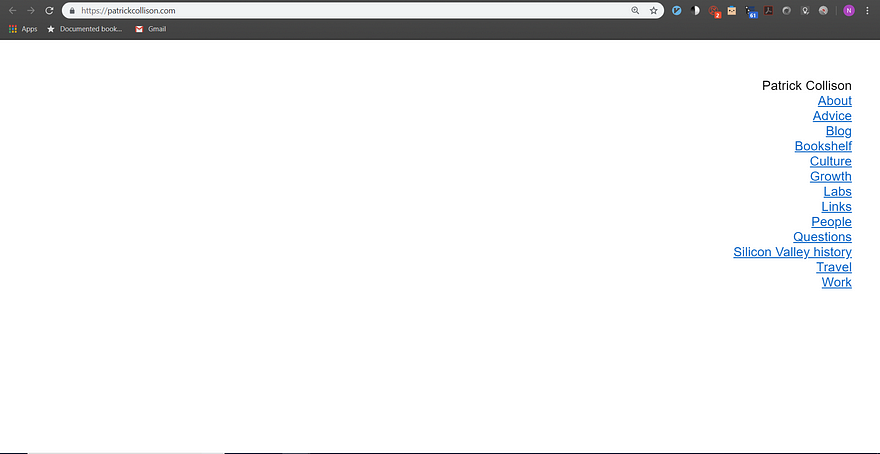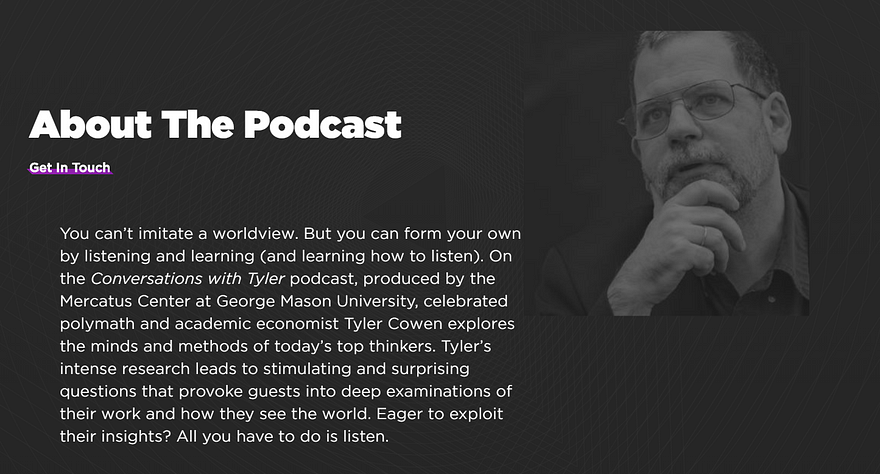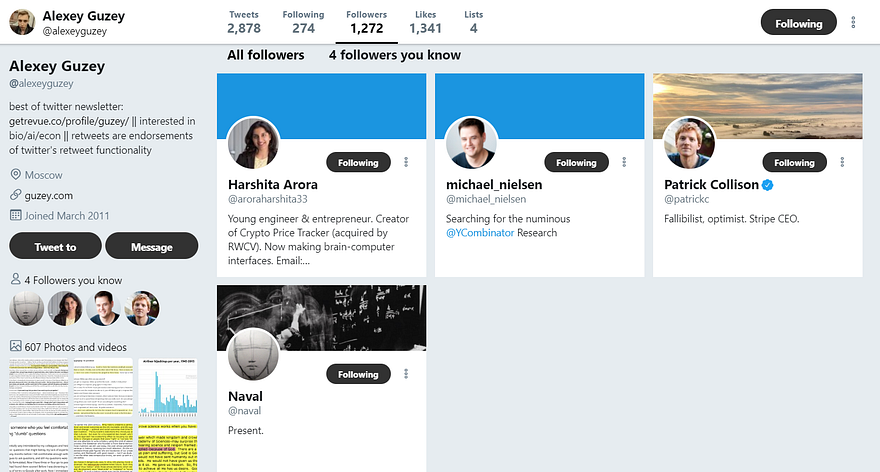How to surf the web to find motivating and insightful content
What I also want to say is that these cool webpages/people that I come across can come to anyone.


“Wow! This was so cool! How do you even find these things?”, asks a curious friend.
I tell him that I got it from the newsletter of <so-and-so> website where people post interesting stuff.
And the next question goes, “Well, but how did you find out about the <so-and-so> website?”
And then I end up telling him about this person on Twitter whom I follow and how she tweets interesting things and how she is SO cool.
“Okay but how did you find out about this person?”
…
And every time, the conversation comes to an abrupt end either because my friend stops asking further questions at the risk of seeming too dumb (and ends up giving me an unsatisfactory “Oh Wow” reaction) or because I fail to remember the exact source (and end up telling something along the lines of — “I just found it while… hmm… browsing on the Internet”).
What I also want to say is that these cool webpages/people that I come across can come to anyone.
But that sounds like patronizing. Not helpful.
And I want to say that it’s all just easy and effortless.
But to the friend, it seems difficult, even impossible.
So, I don’t think any of those are helpful responses to bring this chain of questions to a satisfactory ending.
And this has bugged me for a long time now — what response could bring such a chain of questions to a good end?
I think I have come up with a good solution now. But before I discuss the solution, allow me to convince you why you should read this 2329-worded article on finding “cool” content online.
Why you should care about reading cool stuff online?
The Importance of Reading
Charlie Munger, a long-time business partner to Warren Buffett at Berkshire Hathaway, as been known to say, “In my whole life, I have known no wise people (over a broad subject matter area) who didn’t read all the time — none, zero.”
Warren Buffett’s formula for his success is to keep getting smarter by learning and knowing more everyday.
Naval Ravikant once said that he values no other way of learning more than reading prolifically.
In his advice article, Patrick Collison lists “Aim to read a lot” as one of the few pieces of advice that he would like to give 10–20 year olds.
I think every successful person emphasises on reading a lot. They talk about reading books like it is the secret of their success.
“Go to bed smarter than when you woke up.” — Charlie Munger
Use the Internet to become “well-read”
But I believe that the Internet has amassed enough good, multi-dimensional content that a person can become well-read using the Internet.
The Internet is one of the biggest advantages you have over prior generations. Leverage it. — Patrick Collison
It is filled with high quality personal essays, blogs and micro-blogs, publications, communities of inspired people, interviews, newsletters. And it doesn’t stop at readable content.. you have podcasts, videos and beautifully designed websites. All there for you to consume and become wiser, a better version of yourself. All with a one-tap accessibility feature!
No, I am not being lazy. Neither am I arguing that the content over the Internet can replace the content present in good books.
I am simply asserting that if used well, Internet can provide you with content that is just as useful as books. If we can somehow just tap into this mega-ocean, the Internet can enable us to:
- discover ourselves — search for what we love doing, find motivation to learn something new, be inspired and just be “around” people whom we admire (and even get admired back by them!)
- be aware of the world — and I’m not simply talking about your daily news. I am talking about having an informed opinion about the direction in which the world is moving: the longer trends, the major global problems as they emerge, and the up-and-coming technologies.
- push the boundaries of our physical whereabouts — be able to get inspired by and shape our opinions based what some of the smartest people alive on the planet are saying.
But it is the vastness of the ocean that makes it so difficult to leverage this power of the Internet. And that is why this article.
So without further ado, let me present my answer to the question —
How to surf the Internet to find motivating and insightful content?

So here I have distilled the process of surfing into 4 rules that you should follow to be a good surfer.
4 Rules For Discovering Better Content over the Internet:
Well, they are not so much rules as they are 4 good practices that you should follow for discovering better content over the Internet. And here they are —
- Go to the source and try to find the goose that laid the golden egg. If you liked something on some website, go check out its homepage and About page. If some person tweeted/posted something good on some social media, check out their profile. Every once a while you will hit jackpot and it is going to become your new source of constant new cool information.
- Follow the links and don’t be afraid of going deep into the rabbit hole. Interesting articles link to other interesting articles. Mind you, such links are often quite subtle, meaning that they don’t always explicitly read like “Check out <this link> to know more” but are present more inconspicuously as an underline on some word or phrase in the article.
- Google for stuff. It is more effortless and the results surprisingly more satisfying than you think. Whenever I wanted to know about something, Googling for it not only gives me the answer to it but also helps me discover something new related to it.
- Use Twitter. It is the media platform where some of the best thinkers (both popular and unknown) regularly publish their thoughts. No social media platform has that value proposition. Join it. Use it. Follow people of substance. And just as importantly, constantly weed out your timeline.

So, Google is your oracle for pointing you in the right direction when you seek some information. Twitter is the aggregator that you go to when you don’t seek anything specific but still want to consume something of value. But they aren’t enough! You need to click links through to other links and navigate your way in the thick, amazonian forest in order to find a cave with the gems. And believe me, those are aplenty!
Let me demonstrate by telling you about one such surfing session.
Have you ever felt energized and motivated after a surfing session over the Internet? I had one such session last week..
That week I discovered:
Patrick Collison, co-founder and CEO of Stripe.
I had known about Patrick Collison and that he is a co-founder of Stripe for a long time then but it was this tweet by Paul that got me particularly intrigued about him —
I do a similar thought experiment when I hear startup ideas: how big would this get if you gave it to the Collisons to execute?
— Paul Graham (@paulg) March 4, 2019
Every YC batch I see 20 ideas that would yield billion dollar companies if you did.
And add to it the fact that several of Paul’s essays thank Patrick Collison for reading early drafts. Such an immense validation from PAUL GRAHAM!
Okay, I was curious!
So, one day I decided to look him up. I googled “stripe patrick collison” and visited his weirdly simplistic personal website.

The first link that I went to was the Advice page (because I am always craving advice). There, he has a few pieces of advice for the 10–20 year olds. The one that resonated the most with me was —
If you think something is important but people older than you don’t hold it in high regard, there’s a reasonable chance that you’re right and they’re wrong. Status lags by a generation or more.
But more importantly, it was the links, which that Advice page sent me to, that proved to be even more helpful.. they directed me to discover even more great content!

Here, let me expand on that and tell you about the cool stuff that I found in this surfing session that started with the above mentioned article on Patrick’s blog —
- Emergent Ventures, which led me to discover a new podcast — Conversations with Tyler:
This is a fellowship grant to support entrepreneurs with high risk, high reward ideas. So, as I was checking out this website, I stumbled upon Tyler Cowen’s podcast — Conversations with Tyler. It was exciting to discover this podcast since now I will be able to know how one of the most famous economists of our time thinks…even though his economics blog is largely incomprehensible to me.
I have, since, listened to two of his podcasts (one with Sam Altman and the other with Peter Thiel), got another one downloaded (with Vitalik Buterin), and am totally excited for more!

2. The (n+1)st mention of Pioneer which finally led me to fill out my first Pioneer application:
From the Pioneer website —
“The differentiator of the Ivy League isn’t curriculum. It’s brand and network. Pioneer aims to scale those elements. Our goal is to build a decentralized network of young, creative and exceptionally motivated outsiders who don’t fit in to the traditional system.”
Now that is something that I want, too!
You need to apply with any project that you feel like and then you compete with your fellow Pioneers for the best progress made. I have applied to this month’s tournament with my Good Surfer newsletter (that I will briefly talk about in the end).
3. What should you do with your life by Alexey Guzey:
This is the densest article that I have linked to on this page. It is completely filled with links to other cool, interesting articles and pieces of advice across the Internet. If there was ranking list of the best article on the Web, which took the links present in the articles into consideration, this article would certainly top that list!
4. Alexey Guzey’s blog:
I also discovered Alexey Guzey in this surfing session. He is especially inspiring because his fame is very self-made. It is his blog. He lives in Russia but counts Naval Ravikant, Patrick Collison and Michael Nielsen amongst his Twitter followers, of which there are just 1272 at the time of writing (It feels so good to be a part of an early cohort of something awesome!).

5. Hardcore History podcast:
Meandering through his website, I discovered another great podcast — Hardcore History by Dan Carlin. I find history interesting and I have wanted to keep in touch with subject ever since I read Dan Brown’s The Da Vinci Code in the 9th standard. This podcast seems to be just the thing that I wanted!
Also I saw that Alexey talks about and links to Gwern’s blog a lot. That’s another thing on my surfing list now.
6. Patrick Collison’s Twitter account:
I also checked out Patrick’s Twitter and it looked meaty. Going through it —
- showed me that Stripe’s work culture is particularly good.
- led me to discover the podcast Minds and Machines by Andrew McAfee. He has interviewed Patrick Collison, Eric Schmidt of Google and Reid Hoffmann amongst others. (Yeah I love podcasts! I can’t wait for my next 90 minute trip to and from college when I can listen to them! :p)
Talking about the importance of doing what you love, Steve Jobs once said,
“The only way to be truly satisfied is to do what you believe is great work. And the only way to do great work it to love what you do. If you haven’t found it (what you love) yet, keep looking. Don’t settle.”
Okay, that’s all well and good. But where do I look? How do I search for what I love, Mr. Jobs??
I believe that surfing the Internet can be an answer.
Checking out all those websites and all these articles that inspire you feels like a step in that direction.
7/ Even today, what to study and how to study it are more important than where to study it and for how long.
— Naval (@naval) September 25, 2017
Reading about and seeing people do what they love, either through an article they have written or a product they have made, makes you want to imitate them. Makes you feel the urge to be just as passionate about something in your life too.
And above all else — it gives you motivation. It gives you the motivation to work harder when the physical environment around you does not. It can remedy the effect of having a bad, uninspiring, unfortunate environment.
If you feel that you are unable to find good content on the Internet maybe check out my free email newsletter — Good Surfer:
In this weekly newsletter, I try a different approach to answer the “How to surf” question — by sending you the interesting things that I found in a week and telling you how I found them.
My goal with this newsletter is to help you become a better Internet surfer and thus, enjoy the benefits of being a better reader.
“Develop into a lifelong self-learner through voracious reading; cultivate curiosity and strive to become a little wiser every day.” — Charlie Munger
Thank you for your time! :)
Let me know your thoughts on the approach that I discussed in this article by commenting below. Or you can contact me via Twitter or LinkedIn or shoot me an email at nityeshagarwal[at]gmail[dot]com. Also, you can follow me on Twitter; I won’t spam you feed.

